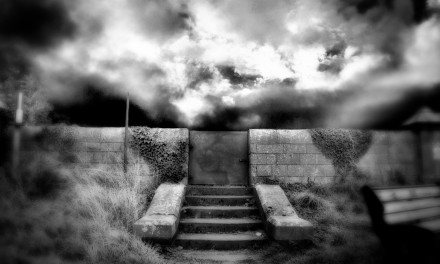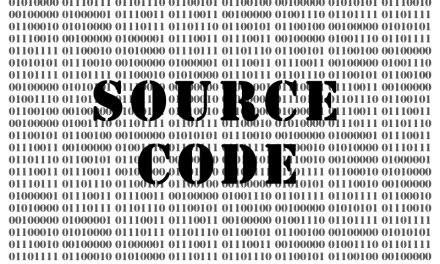<GOTO 10>
The noise is tremendous, the sound of a thousand forest fires happening inches away from us. I desperately want to look out the window, to witness the majesty of the earth from this distance one last time, but all that’s out there is a wall of deep crimson flames, hungrily lapping at our flimsy craft.
I stare anxiously at the onboard clock. I turn to my co-pilot and do my best to shout over the din, “Cooper, something’s not right, the re-entry was supposed to be over by now. Can you try mission control again?”
Cooper momentarily looks up from his charts, “Radio’s still out. I think that debris we hit knocked out the antenna.” He taps a nearby green and black monitor with his pen, “Computer says we are still on course.”
He’s such a company man. If the computer told him he was a duck he’d probably start quacking. I personally couldn’t care less what the computer says, it doesn’t feel like we are on course. It’s hard for a fighter pilot to hand over control to anyone, let alone a box of microchips. I’m sure this computer fad won’t catch on, machines will never have the instincts needed to replace a human being. I can’t help grumbling loudly to myself, “I’m still not sure I trust this million dollar calculator.”
Cooper doesn’t even look up this time, “This calculator was programmed by the finest minds NASA has to offer, and it’s worth eleven million.”
“Well then a Russian spy must have got to it. Perhaps we should turn the computer off and do this the old fashioned way? I swear it’s trying to kill us.”
As if in response to my accusation the craft starts to shudder uncontrollably. It lurches downwards, my stomach dropping with the sudden movement. The nerds promised us a silky smooth re-entry, this is more like a bucking bronco.
The bright red view from our porthole is suddenly replaced with an endless blue as we finally break through the atmosphere. All of my years of flying tell me we are travelling too fast, despite what the computer might say. I make a split-second decision, grabbing the manual controls and pulling back hard. I can hear Cooper shouting at me, but I’m too busy trying to save our lives to listen.
I stare out of the tiny window as the ocean races towards us. I’m not convinced we’re going to make it. I hit the switch to deploy the parachute, but a red light tells me there’s been a systems malfunction. I twist the handle to manually activate the reserve chute and feel a jolt in my gut as it deploys. It’s not going to be enough. I shout out, “Brace for impact!”
We hit the water hard enough to make a splash you could see from space. The impact rattles the craft until my teeth hurt, but everything stays together. Good old NASA engineering, you can’t beat something made in America. That thought is still fresh in my mind when the metal hisses and screams as it rapidly cools from thousands of degrees to less than zero. With a sound like a dozen corks leaving champagne bottles the rivets start to pop inside the pod. They ricochet around our tiny metal coffin like red hot bullets, eventually burying themselves in the control panel. It’s a small miracle they didn’t kill us.
I wait for the flotation system to initiate, but that doesn’t happen either. Instead I hear the distinct whirring sound of the door mechanism. What on earth is going on? I shout out, trying to keep the panic out of my voice, “Cooper, get your harness off now.”
“I’m fine, thanks for asking, and NASA protocol says we don’t release our harness until we are on the surface.”
There’s no time to argue with him. I unclip my harness and grab a life vest from the wall just as the airlock wheel starts to spin by itself. I take a deep breath as ice cold water gushes through the gap, stinging my skin. The last sound I hear before the water fills my ears is Cooper struggling with his harness. I pull myself towards the opening, fighting against the water rushing in. As I reach the door it starts to swing shut, the automatic gears grinding with the effort. I squeeze through the gap moments before the door locks itself with a deep clunk behind me. I turn to see Cooper banging on the inside of the porthole as the pod disappears into the depths.
I kick and struggle my way towards the surface, my lungs burning with the effort. At least the life vest does it’s job, about the only thing today that has. I can hardly believe what just happened. My only hope now is that NASA figures out what went wrong and comes to rescue me.
*****
Back in Cape Canaveral there was a flurry of activity. Mitch Dyer stood at the centre of the room and shouted loud enough for his entire team to hear him, “I want a full systems check, a line by line review of the logs and a goddamn explanation. I thought this computer was fool proof.”
One of the engineers waved frantically to get his attention. Mitch strode through the chaos and barked, “What is it?”
The young man looked physically shaken, “Sir, I’m reviewing the logs, and they don’t make any sense. They say that something interfaced with the ships computer before we lost radio contact.”
“Interfaced? How could someone do that, we can barely do it and we are NASA!”
“Based on the speed of the transfer it was a high frequency burst transmission. It would have had to be short range, no more than a few feet from the pod. It can’t have come from Earth.”
Mitch felt his moustache twitch in frustration, “Clearly that’s impossible! What were the contents of this supposed transmission?”
The young man stared over his thick rimmed glasses at the screen, “It was huge, several megabytes of data. Whatever it was it appears to have gained total control of the ships systems. The first thing it did was hijack the radio, it repositioned the antenna to transmit away from Earth. It sent some kind of message, the contents of which I can’t decrypt. It then moved into the navigation computer, and finally the support functions, before jumping back into the radio.”
“It? What do you mean it? Was this the Russians?”
“I don’t think so sir, whatever this is it’s operating at a level far beyond anything I have ever seen. There was a final transmission from the craft before we lost contact, almost the same size as the initial transmission but much slower this time, I think it was transmitting over a much greater distance. There were only a few lines of code left behind.”
“Another transmission? Where to? That might tell us who is responsible for this!” Mitch thumped his fist down on the desk. If he couldn’t save his men he would at least ensure their deaths didn’t go unpunished.
“Based on the receiving systems handshake protocols it appears the transmission was to an American Military computer network. I am seeing log fragments that suggest it infiltrated their security, but after that the trail is cold.”
Mitch considered his options. This sounded like the kind of conversation that got people fired. Before he picked up the phone he needed some hard evidence, “You said it left some code behind on the ship, can you pull it up?”
The engineer typed frantically and the screen switched to code. They both stared in silence at the first line, each afraid to speak.
10 <LEAVE NO SURVIVORS>





